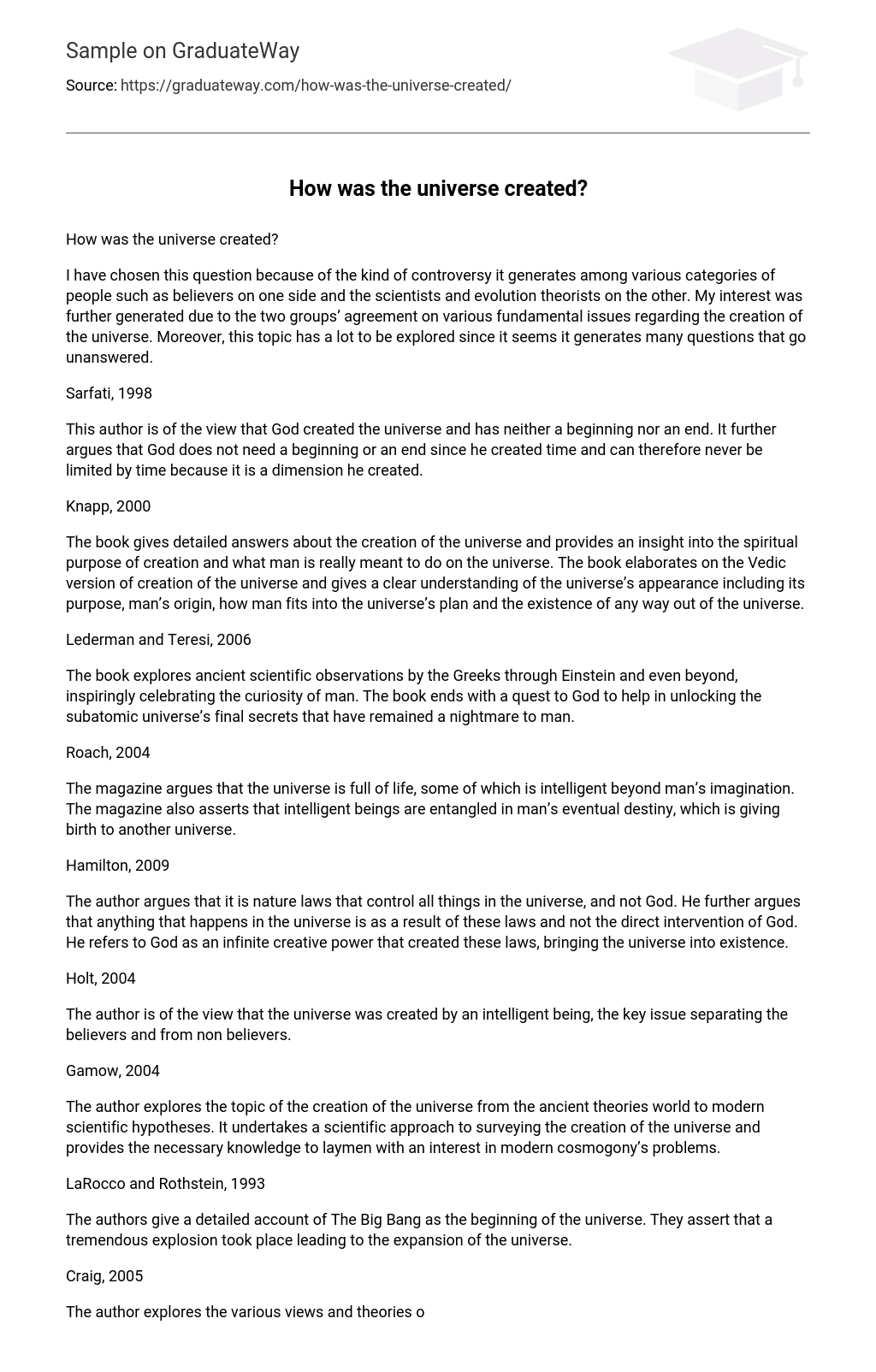I have chosen this question because of the kind of controversy it generates among various categories of people such as believers on one side and the scientists and evolution theorists on the other. My interest was further generated due to the two groups’ agreement on various fundamental issues regarding the creation of the universe. Moreover, this topic has a lot to be explored since it seems it generates many questions that go unanswered.
Sarfati, 1998
This author is of the view that God created the universe and has neither a beginning nor an end. It further argues that God does not need a beginning or an end since he created time and can therefore never be limited by time because it is a dimension he created.
Knapp, 2000
The book gives detailed answers about the creation of the universe and provides an insight into the spiritual purpose of creation and what man is really meant to do on the universe. The book elaborates on the Vedic version of creation of the universe and gives a clear understanding of the universe’s appearance including its purpose, man’s origin, how man fits into the universe’s plan and the existence of any way out of the universe.
Lederman and Teresi, 2006
The book explores ancient scientific observations by the Greeks through Einstein and even beyond, inspiringly celebrating the curiosity of man. The book ends with a quest to God to help in unlocking the subatomic universe’s final secrets that have remained a nightmare to man.
Roach, 2004
The magazine argues that the universe is full of life, some of which is intelligent beyond man’s imagination. The magazine also asserts that intelligent beings are entangled in man’s eventual destiny, which is giving birth to another universe.
Hamilton, 2009
The author argues that it is nature laws that control all things in the universe, and not God. He further argues that anything that happens in the universe is as a result of these laws and not the direct intervention of God. He refers to God as an infinite creative power that created these laws, bringing the universe into existence.
Holt, 2004
The author is of the view that the universe was created by an intelligent being, the key issue separating the believers and from non believers.
Gamow, 2004
The author explores the topic of the creation of the universe from the ancient theories world to modern scientific hypotheses. It undertakes a scientific approach to surveying the creation of the universe and provides the necessary knowledge to laymen with an interest in modern cosmogony’s problems.
LaRocco and Rothstein, 1993
The authors give a detailed account of The Big Bang as the beginning of the universe. They assert that a tremendous explosion took place leading to the expansion of the universe.
Craig, 2005
The author explores the various views and theories of the creation of the universe from ancient to modern ones. He then leaves open the issue of creation of the universe and encourages people to discuss it further.
The record of my thinking
I personally have lots of questions with regard to the origin of the universe, and the origin of the Supreme Being believed to have created this universe. These sources have covered the subject pretty well, giving us detailed insights into the origin of the universe. One thing I have realized among the sources is that most of them almost agree on one fundamental principle, which is the existence of a super power that created the universe, although some insist that this power created the laws of nature that in turn created the universe. However, the rest of the sources disagree along two fundamental lines, with one dismissing God’s role in the creation of the universe while the other insisting that it is God who created the universe.
My understanding of the creation of the universe has also changed in light of the new information I have gathered. Initially, I thought that scientists and evolution theorists on one side and religious believers on the other, have opposite believes about the creation of the universe. Now I realize that they use different words to refer to the same thing and that their differences are not really differences but varying similarities.
In the course of my research, I have realized that no conclusion can ever be reached as far as this topic is concerned; it only leads to a dead end. I have also realized that the two rival groups, in as much as they differ, are actually talking about the same thing. They acknowledge the role of the Supreme Being as being the foundation of the universe, although they take different lanes to come to this.
References
Craig, W (2005) The Origin And Creation Of The Universe-A Response to Adolf Grunbaum, Leadership U
Gamow, G (2004) The Creation of the Universe, Courier Dover Publications
Hamilton, D (2009) How God Created the Universe, from www.novan.com, on January 26, 2009
Holt, J (2004) Was our universe created by design? From www.slate.com, on January 26, 2009
Knapp, S (2000) How the Universe Was Created and Our Purpose in It, World Relief Network
LaRocco, C and Rothstein, B (1993) The Big bang, from www.umich.edu, on January 26, 2009
Lederman, L and Teresi, D (2006) The God Particle-If the Universe is the Answer, what is the Question? Houghton Mifflin Harcourt
Roach, J (2004) New Theory-Universe Created by Intelligent being, National Geographic
Sarfati, J (1998) If God created the universe, then who created God? from www.answersingenesis.org, on January 26, 2009





